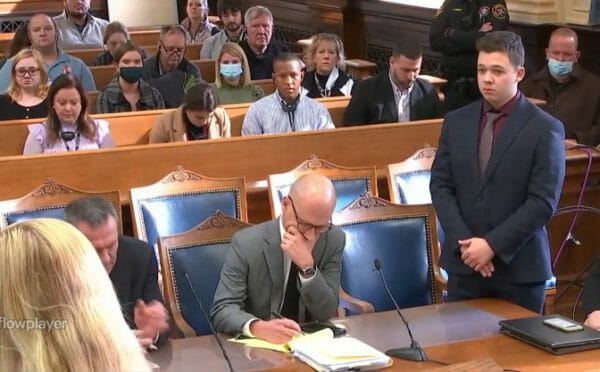
U.S.A. –-(AmmoLand.com)-— On January 19, 2022, documents were filed with the Kenosha County Circuit Court asking Judge Bruce Schroeder to award ownership of the rifle Kyle Rittenhouse used to defend himself on August 25, 2020, during the riots in Kenosha, Wisconsin. He is also asking for the return of Kyle’s iPhone, ammunition, and clothes.
From the kenoshacountyeye.com:
Kenosha County Circuit Court Bruce Schroeder will have to decide who is the rightful owner is of a Smith and Wesson M&P 15 rifle. This is the rifle used by Kyle Rittenhouse on August 25, 2020 to kill two assailants and wound a third. Schroeder will also be asked to decide if sporting rifle will be released at all. According to court documents filed this afternoon, ADA T. Clair Binger (D) and DA Michael Graveley (D) are not releasing the AR-15 Rifle to Rittenhouse after being asked by his attorney, Mark Richards.
The testimony of both Rittenhouse and Dominick Black established the intent was for the rifle to be transferred to Kyle when he became 18. From Kenoshanews.com:
The filing states: “As established through the trial testimony of both Dominick Black and Mr. Rittenhouse, the Smith & Wesson M&P 15 rifle … was purchased by Dominick Black but was to become the legal property of Kyle Rittenhouse upon his 18th birthday,” which was Jan. 3, 2021.
According to Kenoshacountyeye.com, this isn’t the first time Kenosha County prosecutors have refused to return legally owned firearms to their owners.
Also, “This isn’t the first time T. Clair Binger refused to return a gun to someone he lost a case against. Even though Binger told a podcast host that he has a concealed carry license and caries a gun, he in universally known as being a strong gun-control supporter.”
Kyle Rittenhouse says he wants the rifle to destroy it. Judge Schroeder will get to decide if, under Wisconsin law, the rifle belongs to Kyle, because of the oral contract between Kyle and Dominick.
To this correspondent, the more important question is:
Was it a legal contract under federal firearms law?
The firearm was not substantially transferred to Kyle before the present. Everyone agrees the rifle was/is legally owned by Dominick Black. Much has happened since the event-filled day of August 25, 2020. Legally, the rifle still belongs to Dominick Black. The legal risk to Dominick Black if the rifle is transferred to Kyle Rittenhouse is probably small.
In 2014, the Supreme Court, in United States v. Abramski, ruled it does not matter if a firearm is legally transferred to another person if the firearm was purchased as a straw purchase.
At present, the rifle Kyle carried was never substantially transferred to him. If it is transferred to Kyle, Dominick Black may be at risk for a straw purchase prosecution under federal law.
It seems unlikely; Abramski was a very strained 5-4 decision by a far-left majority. But it is precedence. A lot of punishment by process could be entailed.
I talked to Attorney Anthony Cotton of Kenosha, who represented Dominick Black, to see what he thought of the risk. He said the defense was structured, from the start, with cognizance of potential federal law:
“We have been cognizant of potential federal liability from the beginning.”
About half of Cottons practice is in federal firearms law, so he is well aware of the law and the Abramski decision.
I asked if he was concerned about possible legal exposure for Dominick Black. He said he wasn’t
“No, I am not.”
“It is something that if it happens, then we will deal with it.”
Attorney Cotton said he no longer is representing Dominick Black. He said if Dominick Black wants to pursue legal recourse to have his rifle returned, then Dominick can do that with a different attorney.
Attorney Cotton:
“We got it dismissed, so my work is done.”
Perhaps this correspondent is concerned with a minor issue. Dominick Black was always a minor player in the case; he cooperated with the prosecution. No federal charges have been brought. The Abramski case was a rare prosecution.
In today’s climate, prosecutors seem willing to strain statutes to the limit, in order to persecute perceived political opponents.
To the advantage of Dominick Black, the Biden administration seems incompetent. Their plate is full of multiple, self-inflicted crises overseas and at home. Rampant inflation, disruption of civil society, soaring energy prices are a few domestic issues that come to mind.
Hopefully, persecution of a minor player in a trial which showed President Biden to be a clueless and cruel bigot, will not be a high priority.
The Federal statute of limitations for felonies is five years after the offense was committed. This assumes due process and the rule of law still applies.
About Dean Weingarten:
Dean Weingarten has been a peace officer, a military officer, was on the University of Wisconsin Pistol Team for four years, and was first certified to teach firearms safety in 1973. He taught the Arizona concealed carry course for fifteen years until the goal of Constitutional Carry was attained. He has degrees in meteorology and mining engineering, and retired from the Department of Defense after a 30 year career in Army Research, Development, Testing, and Evaluation.

